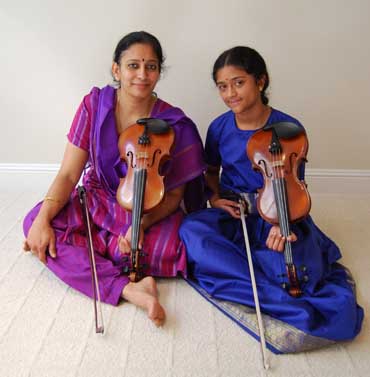 Thirteen-year old Sruti Sarathy has been working with master musician Anuradha Sridhar in Carnatic violin for almost six years; this year they participated in ACTA’s Apprenticeship Program.
Thirteen-year old Sruti Sarathy has been working with master musician Anuradha Sridhar in Carnatic violin for almost six years; this year they participated in ACTA’s Apprenticeship Program.
Sridhar hails from the illustrious and legendary Lalgudi family, representing five generations of musicians, whose lineage can be directly traced back to revered saint-composer Sri Thyagaraja, who, alongside Sri Muthuswami Dhikshithar and Sri Shyama Sastri, form the Trinity of Carnatic music. The Carnatic music system traces its origins to the Vedas (4000 BCE) and is based on the system of ragas (melodic scales) and talas (rhythmic cycles), improvisation, and the characteristic use of decorative Gamakas (graces) in rendering notes. Carnatic violin was introduced in the 18th century and is an essential component to Carnatic music concerts today. The Lalgudi Bani style of violin playing developed and perfected by Sridhar’s predecessors aspires to reproduce vocal music through soft and sweet bowing techniques and clothing complex rhythms in melody. Sarathy comments that her teacher believes, “as her forefathers have for generations, that ‘the violin must sing.'”
Starting her training from five years of age, Sridhar has performed and lectured all over the world, and brings her musical legacy to all the work she does. “Whether I am performing or teaching, I am always aware of the legacy handed down to me and know that I have an important role to play in ensuring that it is preserved and protected.” Sridhar is the only violinist from the Lalgudi family based in the United States, and thus, she feels “it very important to propagate and educate our young and future generations.”
Currently, in the midpoint of an intensive ten-year curriculum together, Sridhar and Sarathy participated in the Apprenticeship Program, meeting weekly in Sridhar’s home, in order to support and deepen Sarathy’s studies. Sarathy herself has garnered local and national attention for her musicianship, accompaniment, and improvisation, winning awards at the national Thyagajara Aradhana music competition which occurs annually in Cleveland, and performing regularly in the San Francisco Bay Area.
Sridhar developed this decade-long curriculum in order to adapt to learning embedded within an American cultural context which differs from the “around the clock” traditional mode of cultural transmission. Nevertheless, disciplined practice regimen is sustained, with Sarathy practicing up to four hours daily in order to develop her playing. “The violin is a very difficult instrument to master, and to learn to play the intricacies of the ragas and gamakas is even harder,” Sarathy notes.
D uring the course of the apprenticeship, the lessons built on their past work together, focusing on musical foundations, introduction to progressively complex composition for violin and vocals, rhythmic and improvistory exercises, finger articulation, and a deeper understanding of the classical repertory and classical composition. With approximately half of the Carnatic musical tradition composed, and the other half based on improvisation, Sridhar worked with Sarathy to develop an understanding of improvisatory principles and practice through imitation, technical application, and sample improvisation studies.
uring the course of the apprenticeship, the lessons built on their past work together, focusing on musical foundations, introduction to progressively complex composition for violin and vocals, rhythmic and improvistory exercises, finger articulation, and a deeper understanding of the classical repertory and classical composition. With approximately half of the Carnatic musical tradition composed, and the other half based on improvisation, Sridhar worked with Sarathy to develop an understanding of improvisatory principles and practice through imitation, technical application, and sample improvisation studies.
Sridhar also emphasized the art of accompaniment in Carnatic violin, which differs dramatically from solo performance. Sridhar trained Sarathy to become a stronger accompanist and hone her ability to spontaneously respond and follow the challenging structures established by a lead musician or vocalist, a process which demands swift rhythmic calculations and a stronger understanding of musical structure.
With the rigorous training from Sridhar, and the dedicated support of Sarathy’s parents—her mother, Vatsala Sarathy, is also a Carnatic vocalist—Sarathy notes that by “playing Carnatic violin, I feel closer to my roots and heritage.”
Sridhar adds, “I selected her for this apprenticeship for her commitment, talent, and hard work, and I believe that she will scale great heights in this art.”
